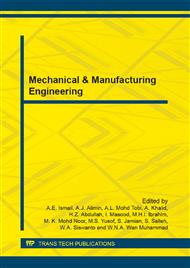p.88
p.93
p.98
p.103
p.108
p.113
p.117
p.121
p.128
The Use of Multi-Agent Systems in Managing Sustainable Supply Chain
Abstract:
The main purposes and challenges in supply chain management are reducing cost and time. Significantly, factors such as the competition of markets in the globe, limitation of energy, raw and virgin materials, environmental protection crisis and increasing of global population dramatically are causing unprecedented issues for the worldwide supply chains for providing goods and services to customers efficiently and effectively. The sustainability approach for Supply Chain Management (SCM) considers the 6Rs principles in four main stages of the supply chains: Pre-manufacture, Manufacture, Use and Post-use. The use of Multi-Agent System (MAS) prepares the most important requirements of an effective sustainable supply chain. At the same time, this agent-based approach provides reliable and agile systems, which will enable enterprises to accommodate ever changing needs of their customers in the future. In this article, the use of MAS for optimal Sustainable Supply Chain Management (SSCM) is reviewed and the integrated functioning of certain agents resulting in information sharing is also demonstrated. With this idea, an attempt is made to provide a MAS model for the SSCM. In the proposed model, each agent performs a specific function of the organization and shares information with other agents. In order to describe this multi-agent based approach, a simple case study is given to illustrate the sustainable supply chain operations.
Info:
Periodical:
Pages:
108-112
DOI:
Citation:
Online since:
April 2013
Authors:
Price:
Сopyright:
© 2013 Trans Tech Publications Ltd. All Rights Reserved
Share:
Citation:


